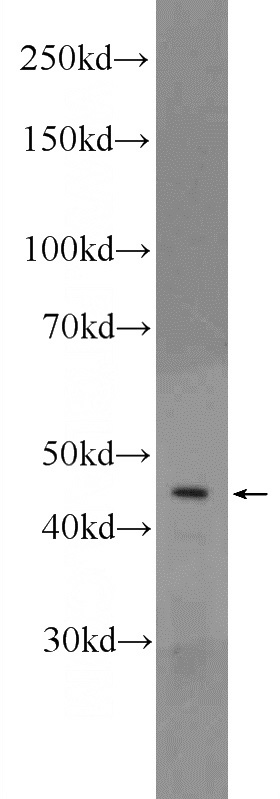-
Product Name
CRHR1 antibody
- Documents
-
Description
CRHR1 Rabbit Polyclonal antibody. Positive WB detected in SH-SY5Y cells. Observed molecular weight by Western-blot: 46 kDa
-
Tested applications
ELISA, WB
-
Species reactivity
Human; other species not tested.
-
Alternative names
CRF R antibody; CRF R 1 antibody; CRF R1 antibody; CRF1 antibody; CRFR antibody; CRFR 1 antibody; CRFR1 antibody; CRH R 1 antibody; CRH R1 antibody; CRH R1h antibody; CRHR antibody; CRHR1 antibody; CRHR1f antibody
-
Isotype
Rabbit IgG
-
Preparation
This antibody was obtained by immunization of Peptide (Accession Number: NM_004382). Purification method: Antigen affinity purified.
-
Clonality
Polyclonal
-
Formulation
PBS with 0.02% sodium azide and 50% glycerol pH 7.3.
-
Storage instructions
Store at -20℃. DO NOT ALIQUOT
-
Applications
Recommended Dilution:
WB: 1:200-1:1000
-
Validations

SH-SY5Y cells were subjected to SDS PAGE followed by western blot with Catalog No:109557(CRHR1 Antibody) at dilution of 1:100
-
Background
Corticotropin-releasing hormone (CRH, also known as Corticotropin-releasing factor, CRF) is a 41 amino acid peptide hormone and a key regulator of the stress response. CRH and the related urocortin peptides (UCN, UCN2 and UCN3) mediate their actions through two mammalian receptor subtypes, CRHR1 and CRHR2 (PMID: 23863939). CRHR1 (also known as CRFR1) exhibits high affinity towards CRH and UCN but low affinity towards UCN2 and no affinity towards UCN3 (PMID: 22684850). The activity of this receptor is mediated by G proteins which activate adenylyl cyclase. Widely distributed through out the brain, CRHR1 critically controls behavioral adaptation to stress and is causally linked to emotional disorders (PMID: 21885734).
-
References
- Chen SJ, Yang JF, Kong FP. Overactivation of corticotropin-releasing factor receptor type 1 and aquaporin-4 by hypoxia induces cerebral edema. Proceedings of the National Academy of Sciences of the United States of America. 111(36):13199-204. 2014.
Related Products / Services
Please note: All products are "FOR RESEARCH USE ONLY AND ARE NOT INTENDED FOR DIAGNOSTIC OR THERAPEUTIC USE"
